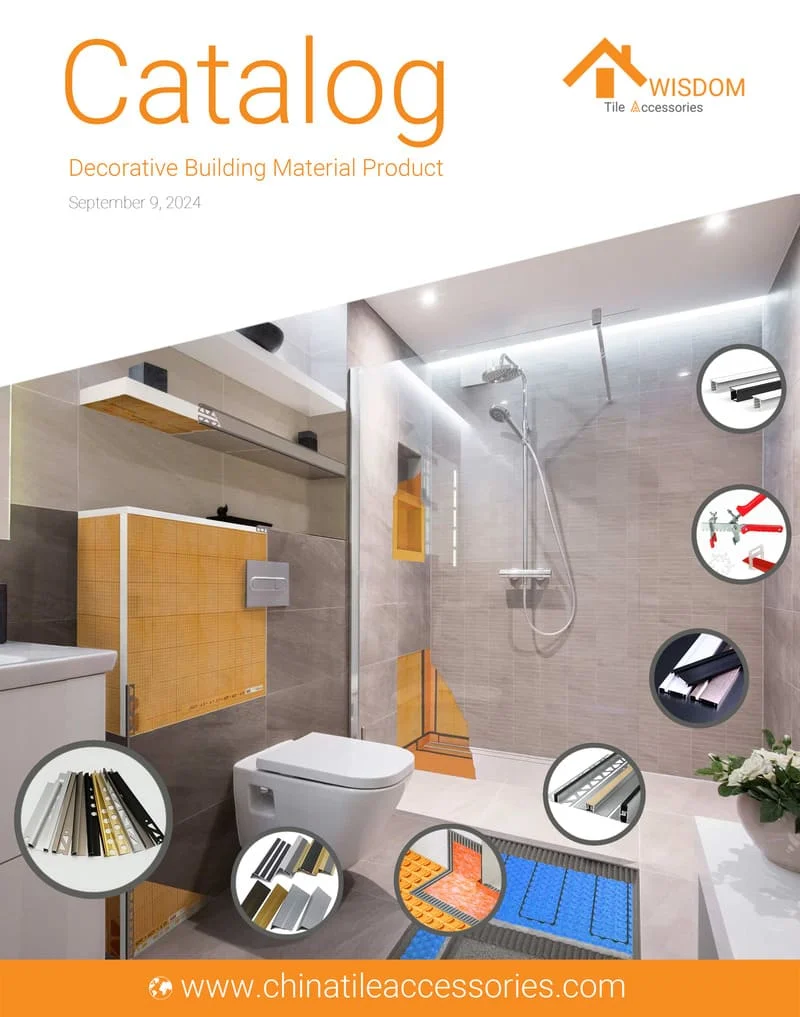In the realm of interior design and architecture, high gloss tiles have emerged as a prominent choice for enhancing the aesthetic appeal of various spaces. Known for their reflective surfaces and sophisticated finish, these tiles offer a unique blend of elegance and functionality.
This article delves into the essence of high gloss tiles, addressing common inquiries and debates surrounding their use, while shedding light on their maintenance and practicality in modern settings.
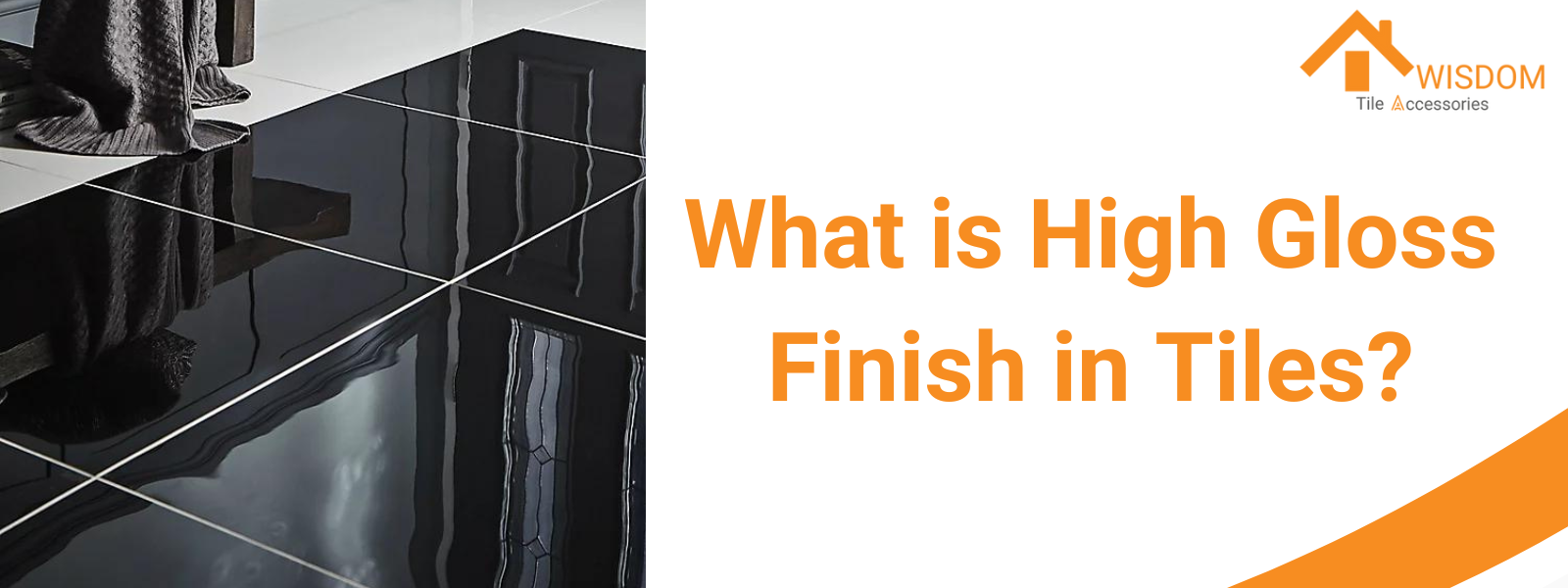
What Defines High Gloss Finish in Tiles?
High gloss finish in tiles is characterized by its reflective, mirror-like surface, which significantly enhances the aesthetic appeal of the tile. This finish is achieved through two primary methods: mechanical polishing and the application of a glossy glaze. Mechanical polishing involves buffing the tile's surface to a high shine, while glazing involves coating the tile with a liquid glass that is subsequently vitrified, or turned into glass, through the application of high heat.
The resulting finish not only makes spaces appear more luminous and open by reflecting light but also contributes to the perceived elegance and cleanliness of the environment. High gloss tiles are especially favored for areas where the visual impact is paramount, such as in lobbies, bathrooms, kitchens, and retail spaces.
On the technical front, the high gloss finish enhances the tile's durability and provides a level of stain resistance, thanks to the vitrification process that seals the tile's surface. However, this shiny finish also means that high gloss tiles can reveal imperfections, such as scratches and dirt, more readily than their matte counterparts. Thus, they may require more frequent cleaning to maintain their pristine appearance.
Cleaning High Gloss Tiles
Maintaining the radiant sheen of high gloss tiles requires a conscientious approach to cleaning and care. While these tiles are renowned for their ability to illuminate spaces and create a visually striking aesthetic, their reflective surfaces can also unveil smudges, water spots, and dust more readily than matte surfaces.
Daily Cleaning Tips
For daily maintenance, it's advisable to use a soft, non-abrasive cloth or mop paired with warm water and a mild detergent. The key is to avoid using harsh chemicals or abrasive tools that can scratch or dull the glossy surface. After washing, a thorough rinse with clean water followed by drying with a soft towel helps prevent water spots, ensuring the tiles retain their luminous quality.
Tackling Stains and Spills
Immediate action is paramount when dealing with spills on high gloss tiles. Allowing liquids, especially those that are acidic or colored, to sit can lead to staining. Blotting spills promptly with a soft, damp cloth can prevent permanent marks. For tougher stains, a solution of water mixed with a small amount of mild detergent can be effective, ensuring to rinse the area well to avoid leaving residues that could attract more dirt.
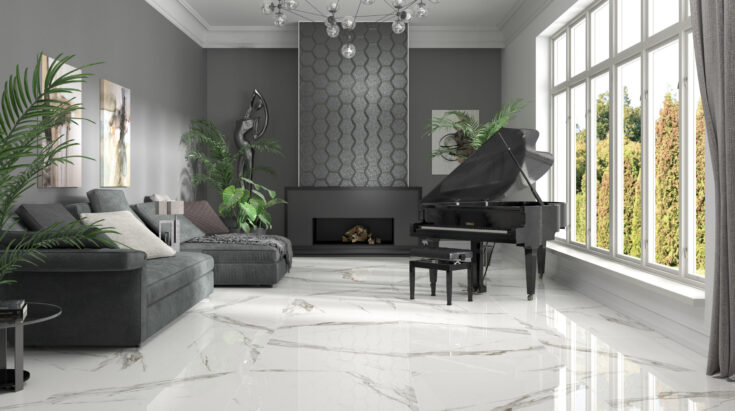
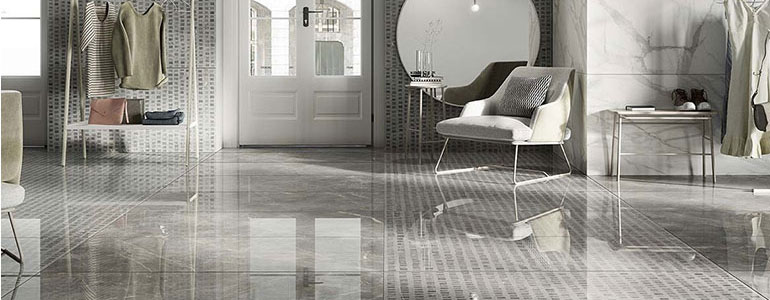
Scratch Prevention
High gloss tiles are susceptible to scratches, which can detract from their shiny finish. Placing rugs or mats in high-traffic areas and using protective pads under furniture legs can minimize the risk. Regular sweeping or vacuuming to remove dirt and debris also prevents scratches caused by foot traffic over gritty surfaces.
Enhancing Slip Resistance
Concerns about the slipperiness of high gloss tiles, especially when wet, can be addressed through proper maintenance and the use of non-slip mats or rugs in critical areas. For environments where slip resistance is a significant concern, treatments are available to enhance the grip of high gloss tiles without significantly affecting their appearance.
Restoring Tile Shine
Over time, high gloss tiles might lose some of their sparkle due to the buildup of cleaning residues or minor surface scratches. A professional polish can restore their original gleam. However, this should be undertaken sparingly and by professionals to avoid damage.
While high gloss tiles demand a level of maintenance that is slightly more involved than other finishes, the visual rewards they offer can make the effort worthwhile. With routine care, prompt attention to spills, and protective measures to avoid scratches, high gloss tiles can maintain their allure for years, making them a lasting addition to any space.
Safety and Durability of Gloss Tiles
The decision to install high gloss tiles comes with considerations beyond their visual appeal, particularly regarding safety and durability. The glossy finish, while stunning, introduces questions about slip resistance and long-term wear.
Slip Resistance
High gloss tiles, known for their smooth and reflective surface, can become slippery when wet. This characteristic necessitates careful planning in areas prone to moisture, such as bathrooms, kitchens, and entryways. Employing non-slip mats or choosing tiles with a slight texture can mitigate slip hazards. Additionally, certain sealants and treatments are available that increase the friction of high gloss surfaces without compromising their aesthetic.
Ensuring Tile Longevity
Contrary to common perception, high gloss tiles are remarkably durable when made from robust materials like porcelain or ceramic. However, their reflective surfaces can highlight scratches and wear more than matte finishes. To preserve their appearance, it is advisable to protect them from hard impacts and scratches by using furniture protectors, avoiding dragging heavy objects across them, and regular cleaning to prevent grit from accumulating.
Managing Wear and Tear
High gloss tiles are subject to the same wear and tear as any flooring option, with the potential for fading in areas of direct sunlight and surface wear in high-traffic areas. Regular maintenance and the use of appropriate cleaning products can extend their life and luster. It's also beneficial to keep a few spare tiles on hand for easy replacement of any that become damaged.
Choosing the Right Tile
When considering high gloss tiles, it's important to balance the visual benefits against the practicalities of your space. In residential areas with low to moderate foot traffic, high gloss tiles can offer a durable and beautiful flooring solution. Commercial spaces, though, may require more frequent maintenance to keep the tiles looking their best.
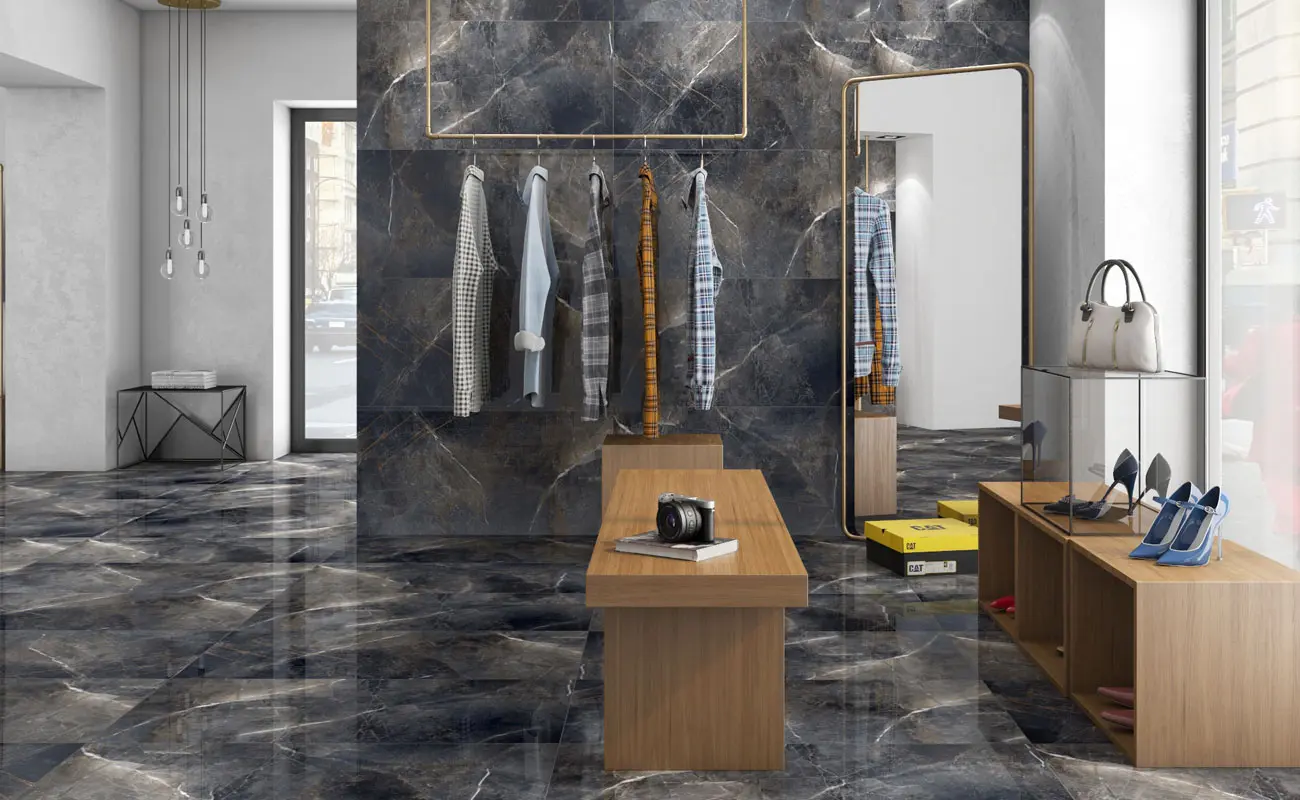
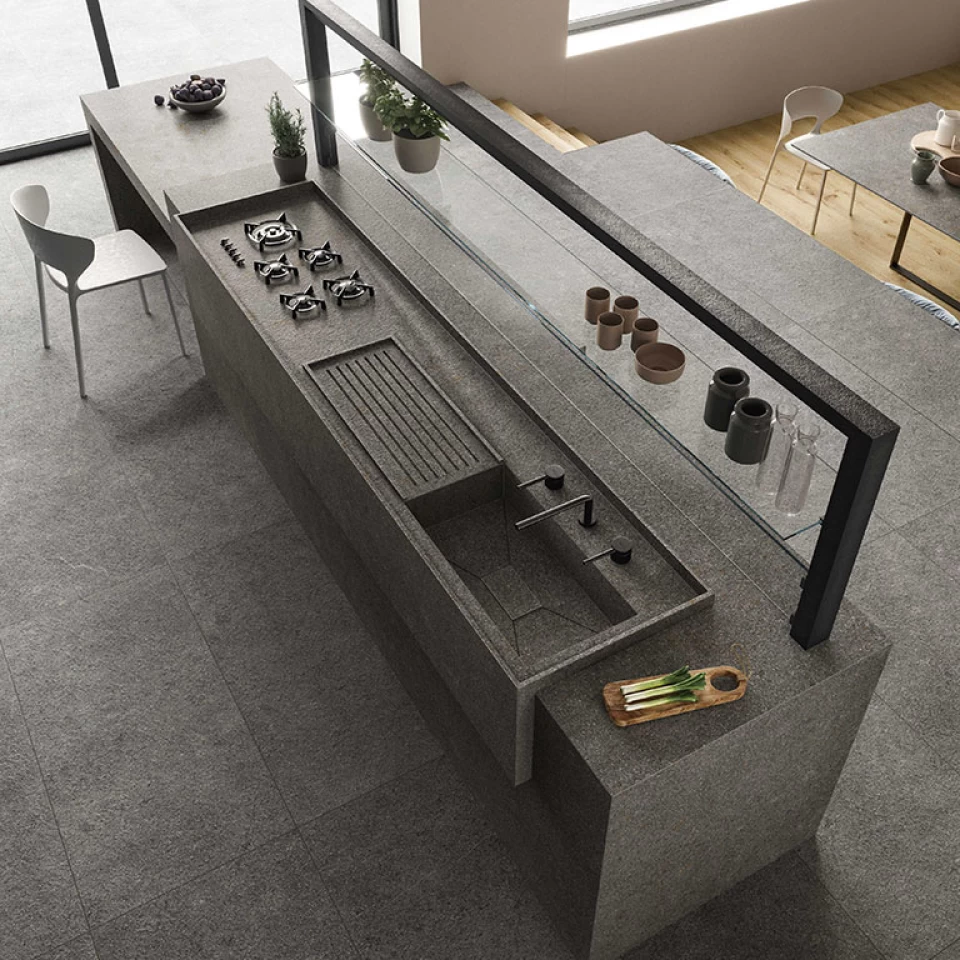
Glossy vs. Matte Tiles
In the realm of interior design, the choice between glossy and matte finishes on tiles presents a significant aesthetic decision with implications for the overall ambiance and functionality of a space.
Comparing Visual Effects
Glossy tiles are celebrated for their ability to reflect light, making spaces appear brighter and more spacious. Their shiny surface adds a layer of sophistication and depth, often used to create a sleek, modern look. Conversely, matte tiles absorb light, offering a softer, more natural appearance. They are frequently chosen for their ability to convey warmth and texture, lending themselves well to rustic or minimalist design aesthetics.
Ease of Maintenance
The reflective nature of glossy tiles means they show water spots, smudges, and dust more readily, requiring regular cleaning to maintain their shine. However, this same quality makes it easier to spot and clean up messes. Matte tiles, while less prone to showing smudges and water marks, can be more challenging to clean thoroughly due to their textured surface, which may hold onto dirt and grime.
Assessing Safety Features
From a safety perspective, matte finishes offer greater slip resistance than glossy tiles, making them a preferable choice in wet areas or spaces where fall risk is a concern. Regarding durability, both finishes are comparably resilient when made from high-quality materials like ceramic or porcelain. However, glossy tiles can show scratches and wear more visibly, which may affect long-term aesthetics.
Matching Design Styles
The choice between glossy and matte tiles often comes down to personal preference and the specific design goals of a project. Glossy tiles can enhance small or dark spaces by reflecting light, while matte tiles are ideal for creating a cozy, understated look. Some designers mix both finishes in a single space for added depth and interest, using glossy tiles as accent features against a matte background.
Enhancing Safety with Gloss
In the quest for the perfect balance between the luxurious appeal of high gloss tiles and the imperative of safety, innovative solutions have emerged. These advancements allow homeowners and designers to achieve the aesthetic benefits of glossy finishes while mitigating the potential risks associated with their slippery nature.
Slip-Resistant Coatings
One of the most effective solutions for maintaining the glossy appearance of tiles while enhancing safety is the application of anti-slip coatings. These clear, thin layers can be applied directly to the tile surface, increasing traction without significantly altering the tile's appearance. Modern formulations are designed to be virtually invisible, preserving the reflective quality of the gloss while providing essential slip resistance, especially in wet areas.
Textured Gloss Options
Advances in tile manufacturing have led to the development of textured gloss tiles, which offer the best of both worlds: the visual appeal of a high gloss finish with the added benefit of a slight texture to improve grip. These tiles are crafted to reflect light beautifully while minimizing the slipperiness often associated with traditional high gloss surfaces. Textured gloss tiles are an ideal choice for areas where aesthetics and safety are equally important.
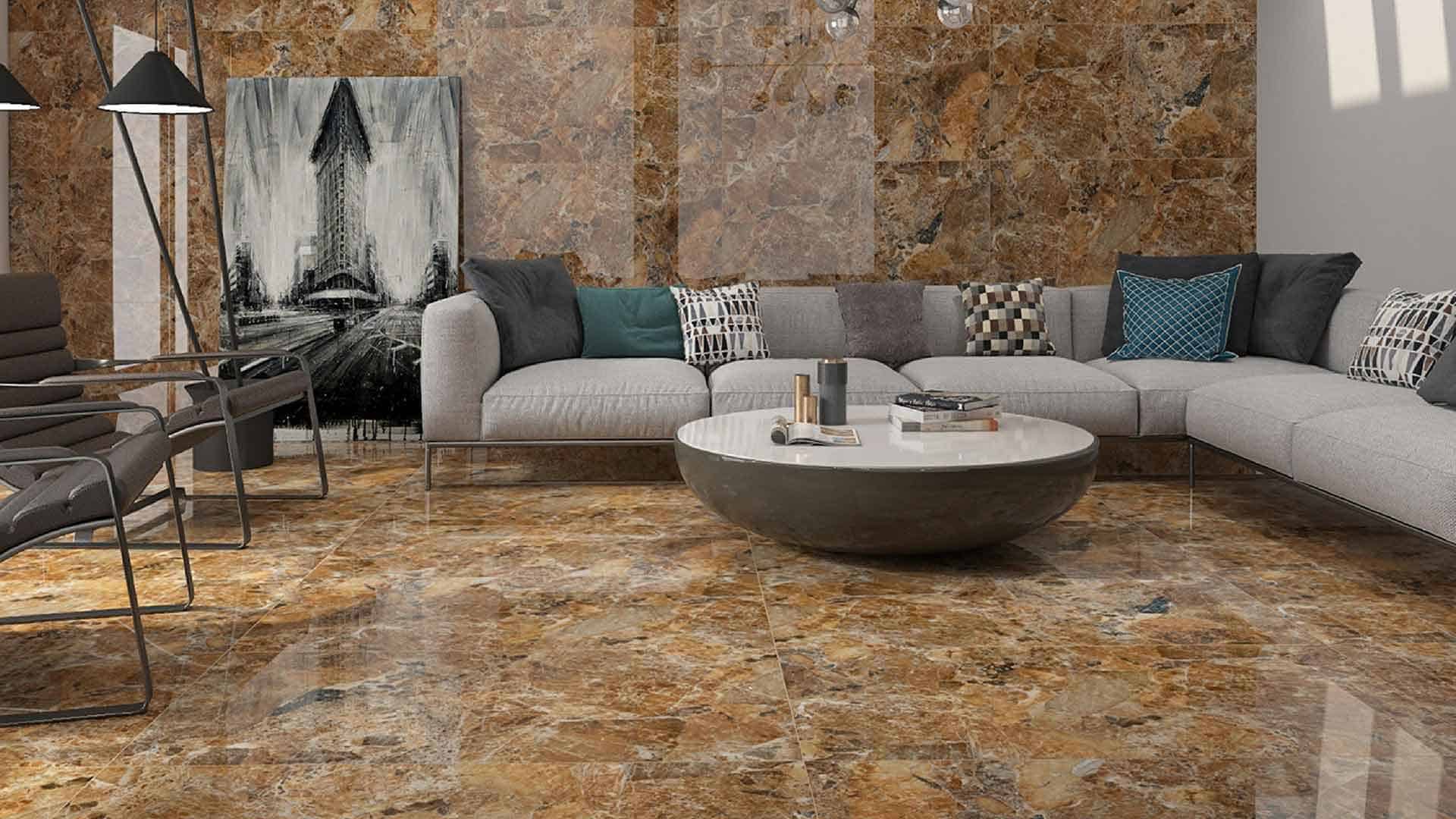
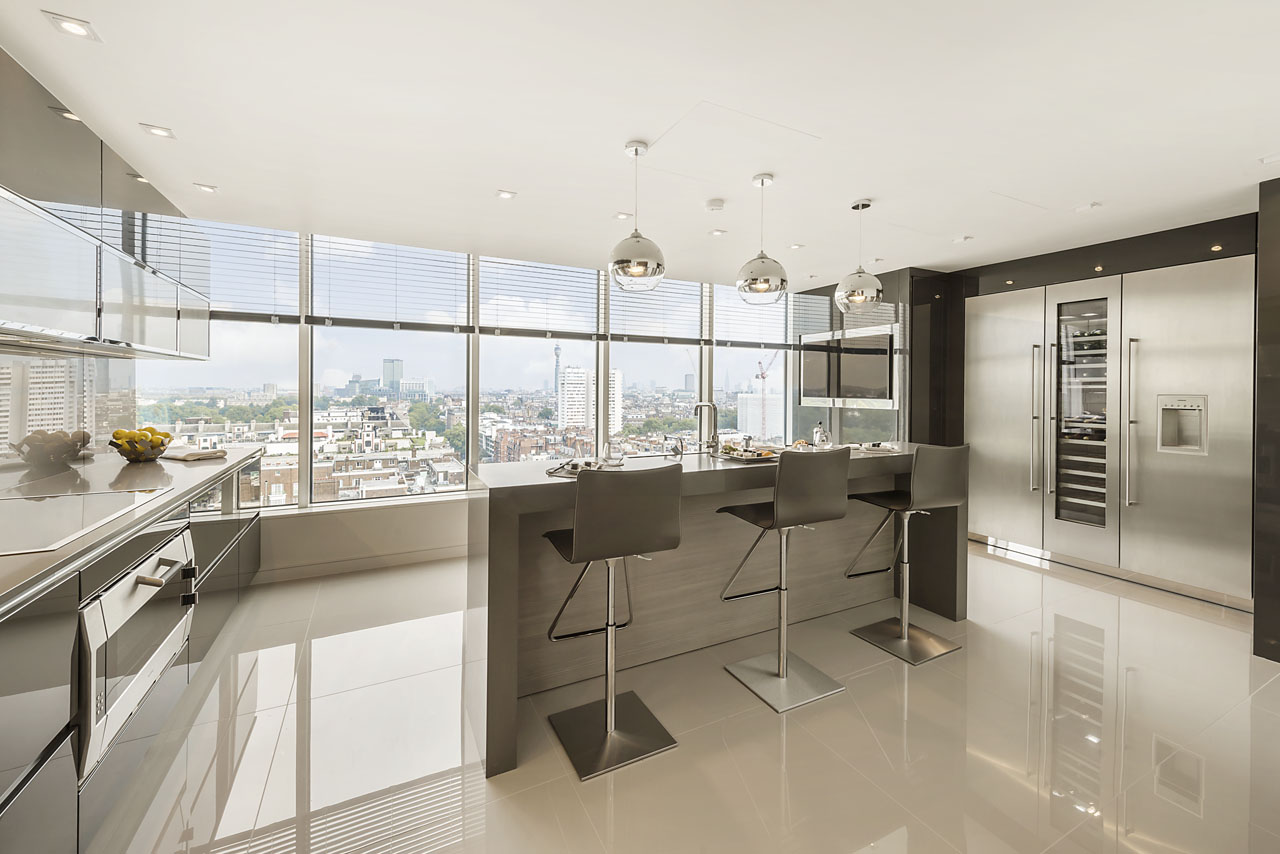
Smart Placement Strategies
Incorporating high gloss tiles into a design without compromising safety also involves strategic placement. High gloss finishes can be used in areas less prone to wetness or spills, such as accent walls, backsplashes, or decorative borders, while choosing matte or textured finishes for the floor. This approach allows for the inclusion of glossy elements in the decor without increasing the risk of slips and falls.
Importance of Maintenance
Maintaining the cleanliness and integrity of high gloss tiles can also play a role in enhancing safety. Regular cleaning to remove any build-up of dirt or grime ensures the surface remains as slip-resistant as possible. Additionally, immediate attention to spills and wet areas helps prevent accidents, keeping the space both beautiful and safe.
Future of Gloss Tiles
The tile industry continues to innovate, exploring new materials and technologies that promise to further enhance the safety of high gloss tiles without sacrificing their distinctive sheen. From nanotechnology coatings that repel water and dirt to improved manufacturing techniques that embed slip-resistant properties directly into the tile, the future holds exciting possibilities for combining luxury and practicality in tile design.
Quick Q&A
Can maintaining high gloss tiles be challenging?
While high gloss tiles can show water spots and smudges more readily than matte tiles, regular cleaning with a soft cloth and mild cleaning solutions can keep them looking pristine. Avoiding abrasive cleaners helps prevent scratches and maintains the shine.
What measures can prevent high gloss tiles from being too slippery?
To reduce slipperiness, applying anti-slip treatments or coatings to high gloss tiles can significantly improve safety. Additionally, using rugs or mats in high-traffic areas can provide extra traction where needed.
How do high gloss and matte tiles compare in terms of benefits and drawbacks?
High gloss tiles offer the benefits of enhanced brightness and space illusion, making them ideal for smaller or darker rooms. Matte tiles, however, provide better slip resistance and hide smudges and stains more effectively. The choice between gloss and matte finishes depends on the specific needs of your space and personal preference.
Is it advisable to mix matte and glossy tiles in the same space?
Yes, mixing matte and glossy tiles can create a dynamic and textured aesthetic in any space. This approach allows for the combination of the reflective elegance of glossy tiles with the understated sophistication of matte finishes, offering both visual interest and functional benefits.
Which flooring option is less prone to becoming slippery when wet?
Tiles with a matte finish or those specifically designed with anti-slip properties offer the best resistance to becoming slippery when wet. Textured tiles or those with a slip-resistant coating are also excellent choices for high-moisture areas.
What are the preferred glossy tile options for specific rooms?
Glossy tiles for the bedroom create a luminous and inviting ambiance, while high gloss tiles for the kitchen and bathroom offer a clean, modern look that's also easy to maintain. In living rooms, glossy tiles can add a touch of elegance and brightness, enhancing the overall decor.


